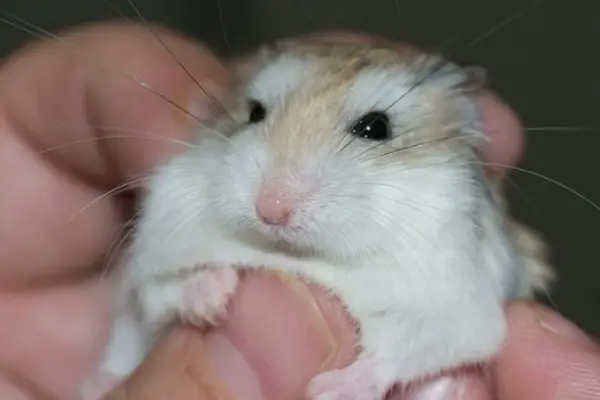9 Common Reasons Why Hamsters Bite And Prevention

There are different reasons why hamsters bite their owners or other hamsters, and we will be discussing the most common reasons in this post.
Hamsters are prey animals and are prone to fear, this is why it’s important to provide a safe environment for them.
Giving them attention and providing a safe spot for them gives them the confidence to explore and stay happy.
Biting for hamsters is a sort of defense mechanism since they are prey animals and that is the only way out when they got nowhere to hide.
Common Reasons Why Hamsters Bite
Fear, feeling threatened, being startled, changing daily routine which leads to frustration, and defending themselves are the most common reasons why hamsters bite.
Let’s break it down further…
Here are some common reasons why hamsters bite:
1. They are thinking your fingers are edible
Hamsters are not known to have good sight which means they have to rely heavily on their sense of smell to get to their food.
This type of bite from hamsters is not hurting as compared to when they bite for fear.
For example, after eating apples or other fruits hamsters love, you don’t wash them off with a running tap.
Your hamster relying on their sense of smell may feel your hands are food and give you a bite, thinking they have food.
Prevention
There is a common way of preventing this form of bite, which is simply washing and cleaning your hands after meals before touching your hamster.
If this kind of biting continues, then the next option will be to rub your hand in their bedding before handling your hamster.
2. Hamsters bite out of frustration
Just like I said hamsters are prey animals who are easily stressed or frustrated with certain types of activities around them.
Loud noises and continuous changing of feeding times can lead to frustration in hamsters and this can quickly turn around on you.
A frustrated hamster will not only bite you but may have a sudden cage rage and also try to escape.
This form of bite due to frustration is normally painful and can cause physical injury.
Prevention
Since loud sounds and changes in feeding times are two of the most common reasons for frustration.
It will be wise to create and stick to a regular daily routine of doing things with your hamster.
Keep your hamster away from all forms of loud sounds and direct sunlight to avoid unnecessary behaviors.
3. Hamsters bite when startled
Hamsters are prey animals, and they know they have to be safe at all times.
This type of bite is not intentional and does hurt, never startle a sleeping hamster.
No matter how safe you think you have made the environment for your hamster do not startle them.
For example, if you arrive home and notice your hamster is sleeping instead of waiting for them to wake up or making some kind of sound you use your hands to touch his butt, this may cause them to bite your hands.
Prevention
This is as simple as it gets, never startles your hamster for any reason.
Always let your hamster know you are about to touch or play with them.
Do not surprise them because they may end up giving you a surprise bite in turn.
Never wake them up when they are sleeping, wait for them to wake up.
4. Hamsters bite when frightened or scared
As previously said, hamsters are prey animals, and they get defensive quickly, which often results in biting or scratching.
We want to avoid a fearful hamster being an angry, jumpy hamster as much as possible, both for the hamster and for you.
Unfamiliar sounds or the presence of other strange pets around can frighten hamsters and if you touch them at that point, then you will get a painful bite.
Prevention
There are two most common options we offer as a preventative measure.
One is to expose your hamster to things that may scare them from their younger age, this means when they grow older they won’t be scared by such things or situations.
Two is to make sure you keep your hamster away from all the circumstances that can get them frightened.
5. Hamsters bite when they are hungry
Hamsters love eating a lot, this can become a problem if you fail to provide them with extra food.
When hamsters are hungry they seek food from any source, this can also lead to unnecessary aggression.
If your hamster smells food on your fingers when you approach it, it may believe you are holding food for them. This can result in biting.
Another reason hamsters bite is to let you know it’s time to feed them.
If you haven’t fed your hamster in a few hours, he or she may be starving. They are known for their ravenous appetites.
Prevention
Make a food regimen that works for you and your hamster and stick to it.
Determine the amount of food your hamster needs each day and stick to it.
Even if you’re only feeding them snacks, try to stick to a routine.
If your hamster is busy eating, avoid touching or holding them.
It’s best not to annoy any hamster that’s eating as they can bite you.
Feed your hamster when it’s time and provide all the necessary nutrients.
6. Poor taming process
Taming is the conditioned behavioral alteration of a wild-born animal’s inherent rejection of humans and acceptance of their presence.
Your hamster learns that biting is unacceptable behavior via your actions, instruction, or corrections during taming or socializing.
So, if your hamster isn’t completely tamed or socialized, he’ll bite everything, including other pets, believing it’s excellent behavior.
In a well-tamed or socialized hamster, biting is not acceptable.
Hamster bites are related to fear and self-defense and are induced by a bad taming or socializing procedure.
Prevention
The only way to prevent this type of biting is to properly socialize or tame your hamster from the very day you bring them home.
Taming your hamster allows you to hold them and holding your hamster has lots of benefits.
7. Unfamiliar scent around their cage
The hamster will begin to relax once he has been accustomed to the scents of his new home, including those connected with you and everyone else in the household.
Hand-training a hamster mostly entails acclimating him to the feel and smell of your hand. Although that nose is little, it possesses a strong sense of smell.
Because hamsters have such a keen sense of smell, they will rapidly detect the presence of a stranger.
If your hamster is approached by someone he or she is unfamiliar with, it may bite in self-defense, believing they are being assaulted.
Prevention
Stop altering the fragrance of your house or your hamster’s cage area.
When people see your hamster for the first time, don’t ask strangers or everyone to touch and hold it.
Instead, let them observe you handling your pet from a distance to avoid smell transfer.
Before your hamster feels secure near a person, he or she must see them multiple times and become accustomed to their scent.
Allowing someone new to hold your hamster should be done only after your hamster has become acquainted with them.
8. Hamsters bite when they don’t trust you
Lack of trust is one of the major reasons why hamsters bite.
If you just brought your hamster home, there’s a good possibility it hasn’t gotten used to you yet.
When you handle your hamster violently, it may feel as if it is being assaulted.
Their natural reaction to being threatened and afraid is to bite.
Biting is a defense mechanism for prey animals, and it is how they protect themselves.
If you keep changing things around you, your hamster may start losing trust in you and this may lead to unnecessary biting behavior.
Prevention
Always provide healthy snacks for your hamster, and they will learn to trust you more after they link your presence with tasty food or fruits.
When you go close to your hamster, approach the cage gently and without making any abrupt movements, and speak in a low, quiet voice.
Hold your hamster for short amounts of time every day, eventually increasing to five minutes or more as they become more accustomed to your presence.
Allow the hamster to approach you rather than chase it around the cage since this will just terrify it and make it more difficult to establish trust.
9. Hamsters bite to defend themselves
As prey animals, the only way to defend themselves is by biting.
Hamsters are great at hiding in the wild and in captivity they can bite to defend themselves when they feel threatened.
Fear is also one of the reasons they may bite to defend themselves.
How to train hamsters not to bite
This is sometimes easier said than done, except you are willing to put in more effort because hamsters are prey animals, and you can’t change that fact.
Here are some common ways to train a hamster not to bite:
- During the first week of ownership, avoid picking up the hamster; begin hand-training in the second week.
- Make sure there are no other pets, noisy children, or other potential stressors in the area.
- During the training, speak softly to your hamster so that he associates your voice with the mild play sessions.
- Before touching your hamster, you should avoid smelling like food or anything else that isn’t the genuine deal.
- Create and stick to a daily routine that works for you and your hamster.
- Allow your hamster to come to you to sniff and explore at his own speed while you hand-train him.
- Attempt to incorporate two or three handling sessions per day into your schedule, and try to do it at the same time every evening.
- Before each hand-training session, wash your hands, and don’t confuse your hamster with a different smell daily.

![What Can Guinea Pigs Not Eat [14 Unsafe Foods] What Can Guinea Pigs Not Eat](https://petcreeks.com/wp-content/uploads/2022/04/What-Can-Guinea-Pigs-Not-Eat.jpg)
![What Do Guinea Pigs Eat [Helpful Tips] What Do Guinea Pigs Eat](https://petcreeks.com/wp-content/uploads/2022/04/What-Do-Guinea-Pigs-Eat.jpg)
![Can Guinea Pigs Eat Broccoli [Benefits & Risks] Can Guinea Pigs Eat Broccoli](https://petcreeks.com/wp-content/uploads/2022/04/Can-Guinea-Pigs-Eat-Broccoli-768x614.jpg)
![Why Ferrets Bite [11 Reasons & Remedies] Why Ferrets Bite](https://petcreeks.com/wp-content/uploads/2023/10/ferret-1972523_640.jpg)
![Can Guinea Pigs Eat Tomatoes [Pros & Cons] can guinea pigs eat tomatoes](https://petcreeks.com/wp-content/uploads/2022/04/can-guinea-pigs-eat-tomatoes.jpg)
